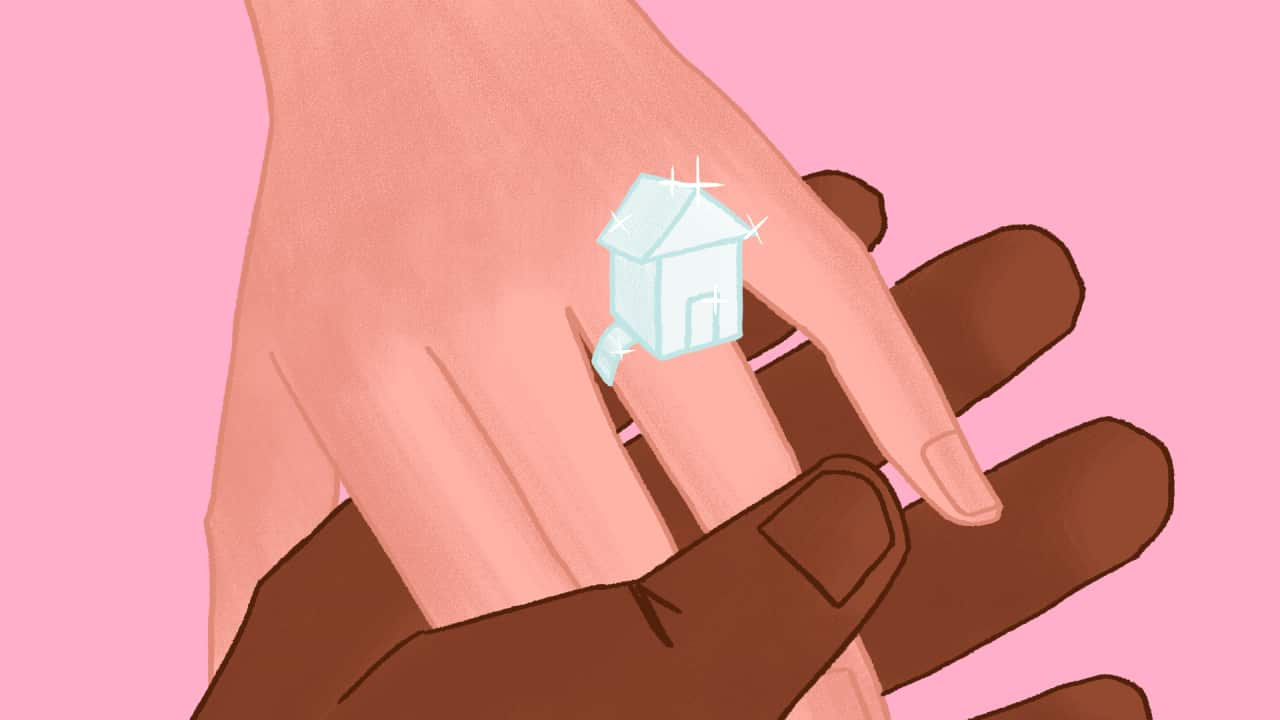John (not his real name) vividly remembers walking his dog with his partner of eight years — and asking his partner, "Is this the rest of my life?"
Just five months earlier, they had bought their first home in a new housing development 20km from the city.
"It felt like we'd gone forward in time 15 years, and we were suddenly 40, living domesticated lives where suddenly we weren't around fun things that we previously had access to," John, 29, told The Feed.
"You go, 'Is this the rest of my life living like this — spending a lot of money every fortnight on my mortgage?'"
The pair had been priced out of their preferred inner-city suburb where they’d previously rented an apartment — and at that point, it seemed a sensible decision to buy in the outer suburbs. But once away from the vibrant inner city suburb within Canberra, the pair realised just how much their relationship relied on the lifestyle they’d enjoyed in their old community.
"It was a realisation that we had changed our lifestyle quite drastically to enable us to buy a house together," John said.
"And it wasn't something we necessarily considered when we were in the process of buying the house.
"We didn't realise we'd have to make concessions about our lifestyle and our location."
The couple ended their eight-year relationship shortly after and John attributes much of that to the location change.
"We both recognised that there were problems that predate the buying of the house or the moving to suburbia, but I do think that was a contributing factor and expedited the breakup."
Deciding between your community and affordable housing
Housing prices have forced young couples to seek cheaper prices away from the city, according to InfoTrack’s property market update. It tallies the most popular suburbs first home buyers bought in recently.

More young couples are forced to buy in the "fringes", like in Sydney's Ambarvale, near Campbelltown. Source: Getty / Andrew Merry
In 2019, 32 per cent of houses within 20km of the Sydney CBD were deemed "affordable" by the PRD Affordable and Liveable Property Guides, which takes into account suburbs that have a median price below the relevant capital city metro area. That number, as of June, is down to 11 per cent. In Melbourne, the number has fallen from 61 per cent to 24 per cent over that period.
While some young couples move to the outer suburbs, others leave the city altogether. From 2016 to 2021, Sydney lost double the number of people aged 30 to 40 as it gained, with 70,000 moving to the regions, according to the NSW Productivity Commission.
Dr Julia Cook is a youth sociologist at the University of Newcastle who has conducted studies on young people moving to the regions. She said young couples are increasingly facing the decision of whether to relocate to afford a home.
"They either go for quite a small apartment and try very, very hard to stay in the area that they've grown up in … which is a very difficult proposition. Or they go for one of these new developments, these expanding suburbs," Cook said.
She said relationships can be strained when couples feel they've lost their belonging and sense of self from leaving social hubs.

Dr Julia Cook, a youth sociologist from the University of Newcastle said young couples are increasingly facing the decision of whether to relocate to afford a home. Source: Supplied
John said losing access to nearby nature spots, cafes and a bustling community affected them as individuals before it affected their relationship.
"I think living in suburbia highlighted the mundane elements of our lifestyle and suddenly it felt like a bit of a checklist," John said.
"You go to work nine to five and you get home and you make dinner and have dinner together at six o'clock, and then you potter around for a little bit and then you're in bed at nine o'clock. That never felt like something that we did when we rented."
Young couples having to adjust to moving to outer suburbs is a phenomenon that will likely affect more people due to housing prices, according to Cook.
Couples alone cannot meet each other's social needs
Cook said social belonging and support are important for both individuals within relationships and without them is the possibility for friction.
"Completely leaving that social context can be very challenging for an individual, let alone for a relationship. So we know that when we're in relationships, we're not just atomised couples, we rely on social support from those around us."
For John and his partner, that network of care meant they could "paper over any cracks" in their relationship.
"We lived in a really fun area and there were always things we could do. We could always go for a nice walk, go to a cafe or a bar or shop somewhere nice. We always felt like we were in the thick of things — and that maybe made things a little bit more exciting."

House prices in Australia have tripled while wages have only increased by 50 per cent. Source: SBS
"They could find themselves surprisingly isolated and in that context could even start to feel disappointed in each other or themselves or move straight to regretting the decision," Shaw said.
She said couples alone cannot meet each other's social needs without external support.
"It could be you've got a local barista that knows you or a neighbour that gets your bins in, but there is something about being known, being visible, a certain sense of reciprocity that occurs in communities — all of those sorts of little interconnections are remarkably valuable," Shaw said.
A system 'setting couples up for failure'
Dr Liz Allen, a demographer at the Australian National University, said the housing situations in place, where young people are forced to the "fringes" of society, are "setting couples up for failure".
"There has to be a renegotiation of your lifestyle … of your relationship, how we identify as a couple, how we get along together, the types of things that we do together in the home and in the community and so on," Allen said.

The median cost of a three-bedroom house in Sydney rose by 26.4 per cent between March 2023 and March 2024. Source: SBS
She said suburbs must include amenities and essential infrastructure to support young people, so they're not having to leave their neighbourhoods to work or socialise.
"When new houses are built, communities are an afterthought — community must be the first thing that you seek to build in a new development."
John said the break-up with his partner was amicable. The pair are now deciding what to do about their joint property.
"At some point, we're going to have to decide together what we do with that property, whether one of us sells, whether moves back in, whether we continue to rent it out."
But for the moment, he's resettling back into his old community in the city.
"These are discussions for the future."














